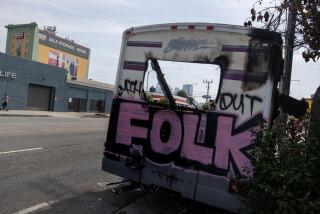Employers Hail Deferral of Car-Pool Requirements : Environment: Local governments are stopped from imposing ride-share mandates on small businesses until 1997.
Small business owners and their advocates cheered Gov. Pete Wilson’s approval this week of a law granting them a reprieve from the pollution-combatting car-pool plans required by Ventura County.
Wilson signed a bill Tuesday that prohibits local governments from imposing car-pool mandates on businesses with fewer than 100 employees until 1997. Backers said the new law will help small businesses weather the recession by lifting a regulatory expense from their backs.
The law temporarily ends a six-month county debate over whether to force businesses with 50 to 99 employees to come up with ride-sharing plans for their employees or face heavy penalties.
“I’m delighted,” said Jere Robings, president of the Ventura County Alliance of Taxpayers, which opposes government burdens on business. “This was a much-needed move.”
Come 1997, however, counties will again be able to order small employers to meet strict car-pooling standards. State law still requires businesses with 100 or more employees to devise ride-sharing plans that by 1997 will have 1.5 employees, on average, in each car commuting to the facility.
Environmentalists deplored the new law for putting off solutions to the county’s air-pollution problem.
“Whatever good it would have done, it wouldn’t have done any good being postponed for three years,” said Mike Stubblefield, the Sierra Club’s local spokesman on air quality issues.
“Business is off the hook for three years,” said Pat Baggerly, a board member of the Environmental Coalition of Ventura County.
Richard Baldwin, the county’s air pollution control officer, said 17% of the fuel emission reductions achieved by the car-pooling regulation--known as County Rule 210--would have come from the smaller businesses.
After much clamor from small business owners last spring, the Board of Supervisors proposed substituting a fee of $17.20 per employee for small employers who felt they could not meet the car-pool standards. The fees would go toward the purchase of old cars that give off excessive amounts of toxic emissions.
Baldwin said that proposal will be shelved with the passage of the new state law.
Supervisor John Flynn, however, said he would like to continue exploring the idea, with the county paying for the “clunker” car purchases out of vehicle registration fees.
“Ten percent of the vehicles on the road cause 50% of the emissions,” he said. “If you want to solve the problem, you go after what’s causing the problem, and that’s junk cars.”
Flynn also suggested that the county require any drivers not car-pooling during rush hour to buy decals allowing them to drive solo on local streets and highways.
But Supervisor Maggie Kildee said that she does not see the county taking any further steps immediately now that the small business car-pooling plans have been put on hold.
“If we do look at (buying up junk cars), it will be in a different light,” she said. “I don’t think it would be anything we’ll do right now.”
News of the change in regulations relieved Ed Barry, director of administration at the Oxnard-based law firm of Nordman, Cormany, Hair & Compton.
Car-pooling would never have worked at the 75-employee company, he said, because the building is surrounded by strawberry fields, the Santa Clara River and the Ventura Freeway, leaving employees no way to get lunch or run errands without a car. Public transportation does not serve the building, he said.
“We would have to have a third of the work force on ride-share, and that seems nearly impossible,” he said.
But Bruce MacDonald, president and owner of Corlund Electronics in Newbury Park, said he plans to go ahead with his company’s car-pooling plan. The firm employs 95 people, about a third of whom already car-pool to the office.
“It’s a little difficult, but we just can’t keep taking from the environment,” he said. “We’ve got to help clean things up.”
MacDonald estimated that his company has already invested 80 to 100 employee hours in getting the ride-share program off the ground. He acknowledged that the same investment might be prohibitive for a smaller company.
One of MacDonald’s employees, Carlos Peralta, said he is thrilled with the company’s new program, which encouraged him to car-pool with two other workers from their homes in Oxnard.
“I love it,” he said. “It’s not that much wear and tear on my car and it makes it simple because it gives me a chance to relax” when the others drive.
More to Read
Sign up for Essential California
The most important California stories and recommendations in your inbox every morning.
You may occasionally receive promotional content from the Los Angeles Times.









